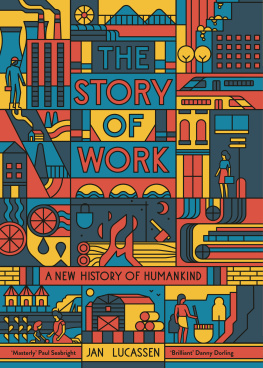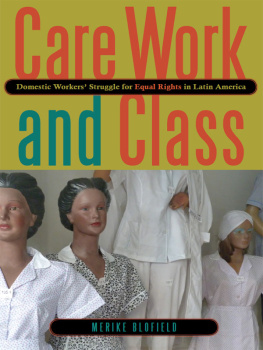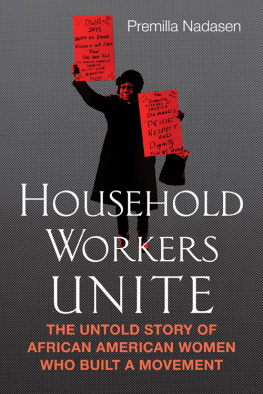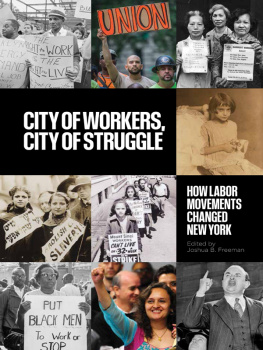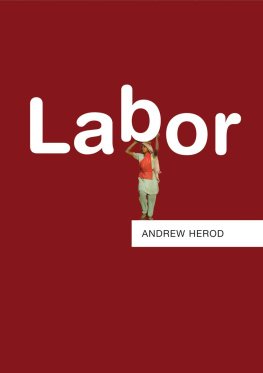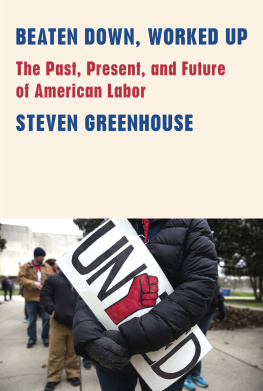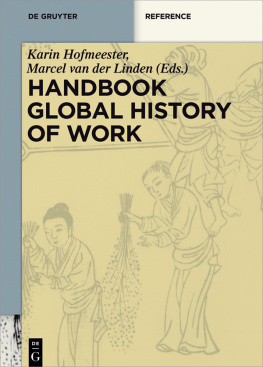THE STORY OF WORK

Copyright 2021 Jan Lucassen
All rights reserved. This book may not be reproduced in whole or in part, in any form (beyond that copying permitted by Sections 107 and 108 of the U.S. Copyright Law and except by reviewers for the public press) without written permission from the publishers.
For information about this and other Yale University Press publications, please contact:
U.S. Office: sales.press@yale.edu yalebooks.com
Europe Office: sales@yaleup.co.uk yalebooks.co.uk
Set in Minion Pro by IDSUK (DataConnection) Ltd
Printed in Great Britain by TJ Books, Padstow, Cornwall
Library of Congress Control Number: 2021935440
ISBN 978-0-300-25679-6
A catalogue record for this book is available from the British Library.
10 9 8 7 6 5 4 3 2 1
CONTENTS
ILLUSTRATIONS, MAPS AND FIGURES
Plate section
In text
Maps
Figures
PREFACE
The idea for this book emerged in the 1990s, in that optimistic period after the fall of the Berlin Wall. State socialism had failed, and with it, apparently, the idea that the exploited worker could only find liberation in a totally classless society. Instead, a new utopian dream began to emerge. This started in the West but was quickly embraced globally, with the same enthusiasm with which Coca-Cola had been welcomed worldwide. From now on, it seemed, we would be able to earn our money as independent entrepreneurs, hiring out our creative talents to the highest bidder. We would have to work perhaps only a few hours a day, or even a week. We would be so successful that, ultimately, we would have time vast expanses of delicious leisure time. Our life would be defined by consumption, not by production.
In this utopia, crucially, only losers work for someone else; the new, true individuals are the self-employed and the entrepreneurs, and everyone craves a portfolio career. And, while the banking crises of 2008 and, more recently, the global coronavirus pandemic have tempered enthusiasm somewhat, this utopia is still alive and kicking, if only because of the lack of a serious challenger. The entrepreneur is a hero, the ordinary worker a slave.
Such a misconception is widespread because it does not reside only among champions of the free market; it is just as much a source for left-wing utopian thinking, which, of course, does not trumpet independent entrepreneurship but rather glorifies wage labour for the community and, with it, the notion of well-earned free time.
I have become increasingly vexed by this view of conventional working people as either exploited victims or as uninventive and unimaginative dullards. Not that I have anything against the entrepreneurial spirit of the individual. But is work and by that I refer specifically to wage labour or small businesses absent from the utopian vistas of boundless expansion a dying occupation? Is the history of the work of the ordinary man and woman no longer important to us? And what does this glorification of leisure time and entrepreneurship mean for womens emancipation and the pursuit of equal opportunities for women in the labour market (let alone the valuing of domestic work)?
Undoubtedly, feelings of vexation are related to my own intense pleasure in intellectual wage labour, and to my upbringing in the context of the post-war work ethos I am, apparently, less touched by the liberating spirit of 1968 than I thought. My encounter with work and its history, shaped, in particular, by contact with India since the mid-1990s, has only strengthened my conviction that it is central to almost every human life on every continent.
In contrast to the utopias heralded by both the right and the left, the daily reality for most of the worlds population is still one of working five to six days a week, usually in household and wage labour. And I dont expect that to change anytime soon. Work is not only necessary for all of us, but, on the whole, it also fulfils us. We experience satisfaction from our accomplishments. It meets our basic need for company, both in and outside the home. Work is not an Old Testament curse, a necessary evil that must be avoided at all costs. Work determines our lives and our social contacts, both positively and negatively. Paradise is neither ahead of us nor behind us.
I have never understood why one type of work is rewarded so differently from another. For example, why is a schoolteacher (like my father) paid half, or even less than half, of what a university professor (like me) is paid? Why is a nurse (like my mother) paid less than the doctor next to her or him? All are busy teaching the same youngsters or helping the same patients, all with exactly the same commitment and effort. To mitigate this imbalance, within a household, we pool income, and in society as a whole, we implement income-levelling tax measures. But that does not answer the original question, nor does it eliminate the original injustice: the disparity in rewards for equal effort and commitment.
Vexation may be a good starting point for raising such an issue, but it is not nearly enough of a reason for writing a book nor is my personal curiosity about work experiences worldwide and in the long term, rather than only in the recent history of the West, as found in most overviews so far. So why do we need this book now?
My sense is that we need to do justice to the experiences of as many working people as possible, then as now, irrespective of cultural, ethnic or social background, because only such an approach can unite us in fellow feeling. Recognizing all the good and all the harm that has and can come from work is crucial in order to make changes to protect and enhance workers lives for the future in our shrinking world. After all, work is an activity that takes up at least one-third of the global populations time on earth; it therefore needs to be understood and appreciated in the broadest possible context. This also may mitigate the feeling that so many people have that in working nine to five they have in some way failed that they have not and will not achieve utopia. If this global overview of the most important human experiences of work and its organization in a social context (household, tribe or community, city, state) succeeds in reaching readers then I will be truly satisfied; but, of course, I am aware that it is only then that the real reflection on all these human experiences can begin.
Intellectually, this is an exercise in labour history, but one that goes far beyond the limits that, until recently, this specialism has imposed on itself by focusing on the history of the male factory worker in the most developed parts of the world. In the last twenty-five years, labour historians have begun to ask questions that go much further in time and space. The International Institute of Social History (IISH) in Amsterdam has played a not insignificant role in this, and I am happy that my ideas have been able to develop in that environment.
A book such as this is inspired from many quarters by the work ethic modelled by my parents, much more than I realize, and by my own work experiences and those of my loved ones. In the last few decades, my thinking on this point has been, without doubt, stimulated and shaped by my colleagues, especially at the IISH (to name just a few: Marcel van der Linden, Lex Heerma van Voss, Gijs Kessler and Karin Hofmeester), but also beyond. I hope those not named will forgive me and find consolation in the references to their work. In addition, a number of colleagues were kind enough to provide comprehensive and often enthusiastic expert commentary on earlier versions, including Wil Roebroeks (Leiden University, especially encouragement. All this help and inspiration does not, of course, relieve me of my ultimate responsibility for this book. I am most grateful to Julian Loose for his confidence and enthusiastic support, to his colleagues at Yale University Press (Rachael Lonsdale, Katie Urquhart and Rachel Bridgewater), to Anna Yeadell-Moore for her excellent and creative translation and editing, to Marien van der Heijden (IISH) for his advice regarding the illustrations from the Institutes collections, to Marie-Jos Spreeuwenberg (IISH), and certainly to Aad Blok (IISH) for his enthusiasm and his assistance in the final stages of the book production. Lastly, to my companion Lieske Vorst, who witnessed the conception and growth of this work from the beginning to the end.
Next page
